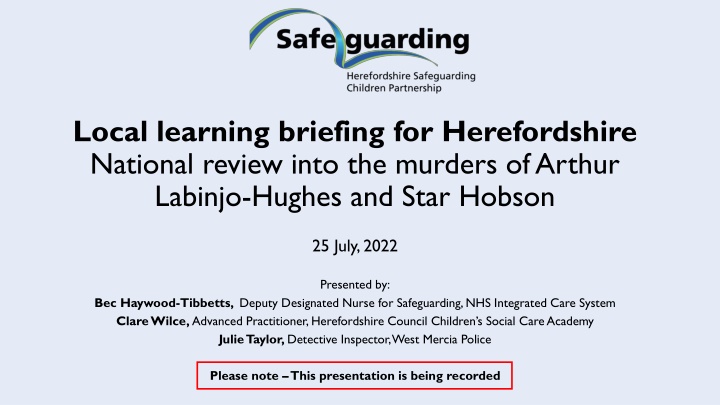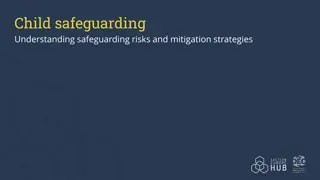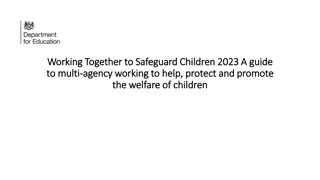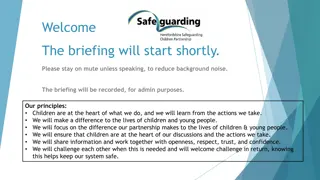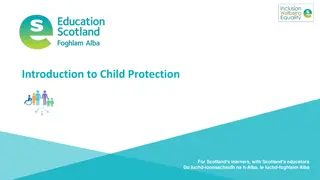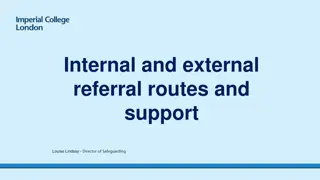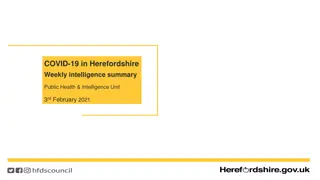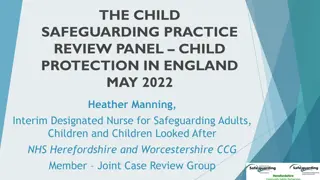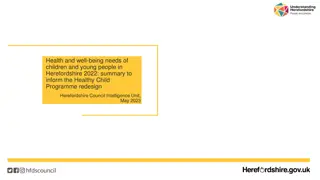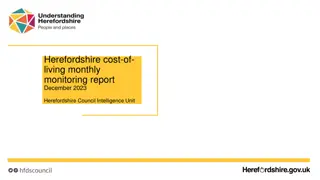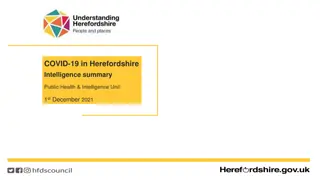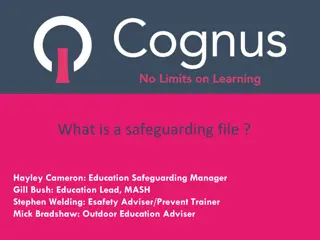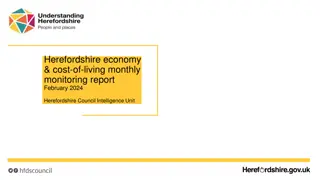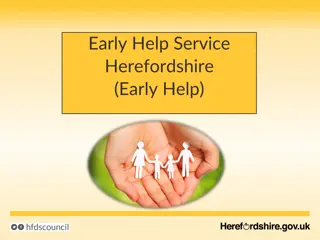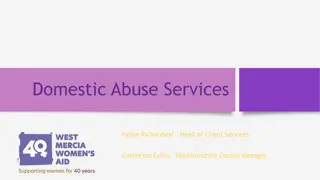National Review Findings and Local Practice implications for Herefordshire Child Safeguarding
The national review into the tragic murders of Arthur Labinjo-Hughes and Star Hobson highlighted weaknesses in information sharing, critical thinking, and agency coordination. Key areas for improvement include enhancing specialist skills, challenging decisions, and empowering leadership for effective child protection. The need for robust multi-agency processes, risk assessment, and understanding family dynamics were emphasized as crucial for preventing similar tragedies.
Download Presentation

Please find below an Image/Link to download the presentation.
The content on the website is provided AS IS for your information and personal use only. It may not be sold, licensed, or shared on other websites without obtaining consent from the author.If you encounter any issues during the download, it is possible that the publisher has removed the file from their server.
You are allowed to download the files provided on this website for personal or commercial use, subject to the condition that they are used lawfully. All files are the property of their respective owners.
The content on the website is provided AS IS for your information and personal use only. It may not be sold, licensed, or shared on other websites without obtaining consent from the author.
E N D
Presentation Transcript
Local learning briefing for Herefordshire National review into the murders of Arthur Labinjo-Hughes and Star Hobson 25 July, 2022 Presented by: Bec Haywood-Tibbetts, Deputy Designated Nurse for Safeguarding, NHS Integrated Care System Clare Wilce, Advanced Practitioner, Herefordshire Council Children s Social Care Academy Julie Taylor, Detective Inspector, West Mercia Police Please note This presentation is being recorded
Todays briefing Summarise the findings of the national review Apply the learning to local practice and key messages for Herefordshire Equip you with guidance and resources to apply in your practice and share with teams
Child Safeguarding Practice Review Panel Children and Social Work Act 2017 Independent Commissions reviews of serious child safeguarding cases Reviews all rapid reviews and CSPRs (case reviews) from local authorities nationally Focus on improving learning, professional practice and outcomes for children
Arthur Labinjo-Hughes was a little boy who loved playing cricket and football. He enjoyed school, had lots of friends, and was always laughing. Arthur died in Solihull aged six on 17th June 2020. His father s partner, Emma Tustin, was convicted on 1st December 2021 of his murder. Arthur s father, Thomas Hughes, was convicted of manslaughter. They are now both serving prison terms. Star Hobson was an inquisitive toddler who loved to listen to music and would dance in her baby walker, laughing and giggling. Star died in Bradford aged 16 months on 22nd September 2020. Her mother s partner, Savannah Brockhill, was subsequently convicted of murder on 15th December 2021 and her mother, Frankie Smith, was convicted of causing or allowing her death. They too are now in prison.
What went wrong Weaknesses in information sharing and seeking within and between agencies. A lack of robust critical thinking and challenge within and between agencies, compounded by a failure to trigger statutory multi-agency child protection processes at a number of key moments. A need for sharper specialist child protection skills and expertise, especially in relation to complex risk assessment and decision making; engaging reluctant parents; understanding the daily life of children; and domestic abuse. Underpinning these issues, is the need for leaders to have a powerful enabling impact on child protection practice, creating and protecting the optimum organisational conditions for undertaking this complex work.
National review finding: Appropriate information sharing and seeking Issues found: Lack of timely and appropriate information sharing Limited information seeking Evidence not being pieced together and considered in the round
Safeguarding is everyones responsibility Everyone who comes into contact with children and families has a role to play (Working Together, 2018) _________________________ Identify and support children who need Early Help Identify and refer children where there are child protection concerns Share information proactively - Respond to requests for MASH checks, participate in and support Strategy discussions, Child Protection Plans, Child in Need Plan, etc. Raise a professional challenge if you have concerns
Making a safeguarding referral (MARF) The Multi-agency Referral Form (MARF) is used by professionals to make a referral to Children s Social Care, via the Multi-Agency Safeguarding Hub (MASH) when there are concerns about a child Before making a referral: 1. Discuss your concerns with the child/family, unless doing so would place a child at risk of harm. 2. Consult the Herefordshire Right Help, Right Time Guidance. 3. Consider discussing your concerns with the Designated Safeguarding Lead in your agency. 4. Advise the family that you intend to make a referral to Children s Social Care, unless doing so would place a child at risk of harm.
Consent should always be sought unless doing so will put the child at risk or it cannot be reasonably expected If consent is not sought, clearly indicate the reasons in the MARF referral form If the parent/carer does not agree to the information being shared, clearly indicate this on the MARF referral form, and reason for sharing the information anyway Practitioners can still share information where the family does not consent, if there is a reason to do so to safeguard the child Gaining consent can help information sharing and ultimately lead to a better decision for the child, and an open and transparent relationship with the family With regard to consent, legislation is clear that sharing information without consent for the purposes of safeguarding is permitted National panel
Strategy discussions Multi-agency discussion to share information and agree course of action Convened when there is reasonable cause to suspect that a child is suffering, or likely to suffer, significant harm. In both Arthur and Star s cases, opportunities were missed when Strategy Meetings were not held. Local case reviews in Herefordshire also found that Strategy discussions were not consistently being held when they should have been. (Thematic Review: Peer on Peer Abuse) More information about Strategy discussions is available on the West Midlands Child Protection Procedures site, in section 1.8 Strategy meeting/discussion | West Midlands Safeguarding Children Group (procedures.org.uk)
Stepping-down Where a plan is stepped down to Early Help or where a parent/carer refuses the support of Early Help consideration must be given as to whether this will adversely impact the child s safety, health and/or development and, therefore, meet the threshold for Statutory Assessment. (SCR Matthew Herefordshire) Continued information sharing will help to determine the needs where there are concerns, even if there is no plan in place To understand if the case meetings the threshold for a Statutory Assessment (Level 4), refer to the Right Help, Right Time Levels of Need Framework
National review finding: Understanding what the child s daily life is like, where this might not be straightforward A persistent finding in child case reviews that children were not spoken to enough Lack of confidence and time Continuously ask: What difference is this making in the life of the child? What is this child s life like, everyday / What is their lived experience?
Launched May 2022 Voice of the Child Participation Toolkit - Herefordshire Safeguarding (herefordshiresafeguarding boards.org.uk)
National review finding: Listening to the views of the wider family and those who know the child well A significant gap in understanding what daily life was like for Arthur and Star was the failure to speak with wider family members. There needs to be greater consistency in speaking to and listening to the views of family/friends, recognising that they may be able to provide important insights into what the child is experiencing. National panel Be aware of language malicious referral
National review finding: Specialist skills and expertise for undertaking child protection investigations Practitioners need to have the right skills and expertise to develop a trusting and respectful relationship with the child, ask the right questions, and to critically reflect on what the child is saying or expressing through their words, actions or behaviours. Most importantly, practitioners need to be given the space and time to do quality work with the child and to critically reflect on the child s experiences National Panel
National review finding: Specialist skills and expertise for working with families whose engagement is reluctant or sporadic Skills of practitioners in establishing authentic support and challenge relationships was key to having a timely response to changing risk. Developing those skills amongst the child protection workforce is therefore essential. National panel Skills needed: Building relationships: trust and cooperation with families who can be or appear to be reluctant to engage with them Balance cooperation with being authoritative and challenging Analyse engagement of families critically Understand factors that may impact on engagement e.g. domestic abuse, coercive controlling behaviour
Disguised compliance Disguised compliance involves parents or carers giving the appearance of co- operating with agencies to avoid raising suspicions and allay concerns. Difficult to identify difference between what the parents are saying, and the practitioner s observations and what has changed The following principles will help identify and address disguised compliance more effectively: Focus onthe needs, voice and lived experience of the child, young person Try to build relationships there is some evidence that an empathetic approach by professionals may result in an increased level of trust and a more open family response leading to greater disclosure by adults and children Techniques like motivational interviewing, encouraging parents to identify their own goals and solutions
Professional curiosity The need for practitioners to practice respectful uncertainty Applying critical evaluation to any information received, and maintaining an open mind Avoid tick-box exercises Why do I think this? What is the evidence? So what? What is the impact? What information is missing? What else could be happening? Gut feeling/ intuition - Why do I feel this way? Think the unthinkable
New partners in a caring role Local and national child practice learning reviews have highlighted instances where new partners, when left in a caring role, have been unable to keep children safe, and in some circumstances have harmed the child/ren. How can professionals help? Have continuing conversations about new partners with the parents/carers you work with Use different sources to gather information Consider if the main carer of the child may be in a coercive/ controlling situation Facilitate a multi-agency professionals meeting where there are concerns Engage with other family members/friends Offer the parent/carer the opportunity to find out about their new partner using sources such as: Domestic Violence Disclosure Scheme - Clare's Law Sexual Offences Disclosure Scheme - Sarah's Law See HSCP Learning Briefings: Myth of Invisible Men New partners in a caring role Myth of invisible men - 35% of all serious incident notifications to the national panel involved serious harm to babies. In the majority of cases, men were the perpetrators. The role that the men play in the child s life and their own experiences were frequently overlooked by services.
Barriers to curiosity Assumptions or unconscious bias Uncertainty Lack of time pressure Worried that you might make it worse Lack of confidence Feeling that you don t have enough evidence to ask questions Culturally competent curiosity understanding different culture, but abuse cannot be condoned for religious or cultural reasons Lack of reflective supervision and support
Signs of Safety approach Signs of Safety is a strengths-based, relationship-grounded, safety-organised approach to child protection practice, to build meaningful safety for vulnerable and at-risk children.
HSCP safeguarding training FREE www.herefordshirecpd.co.uk MEET the LADO Allegations against adults in a position of trust Delivering substance use brief interventions Right Help, Right Time Early Help Assessments Signs of Safety Working Together to Safeguarding Children (Level 3 for safeguarding leads) Exploitation & Vulnerability Graded Care Profile 2 (Child neglect tool) Working Together to Safeguard Children (Level 2) Solihull Approach Public Health West Mercia Police
National review finding: Appropriate responses to domestic abuse Domestic abuse is a feature in a high number of serious incident referrals National panel thematic review (unpublished), highlighted: Lack of understanding of domestic abuse Domestic abuse often named, but not explored Incident-driven responses Lack of whole-system response to domestic abuse Value of specialist domestic abuse input when assessing risk
Domestic Abuse Approaches in Herefordshire MARAC Multi-Agency Risk Assessment Conference Drive Perpetrators programme MASH Multi Agency Safeguarding Hub
National review finding: Critical thinking and challenge within and between agencies A range of factors can impact upon professionals willingness to challenge one another s hypotheses and assumptions. a lack of confidence to challenge decisions; a lack of clarity about how to escalate concerns; and a lack of reflective space To tackle this, requires a change in culture Environment where challenge is promoted and encouraged and more regular opportunities to bridge siloes and consider different professionals perspectives are created.
Herefordshire Professional Differences Policy There is still a reluctance to challenge decisions which are not considered to be correct. Where practitioners do not agree with decisions, they should work to resolve them with reference to the Herefordshire Professional Differences Policy - SCR Matthew (Herefordshire) Challenge means that you are championing the best outcomes for children Refer to the procedure Be timely Raise the challenge formally Professional Differences Policy Multi-agency resolution protocol/guidance, Herefordshire Safeguarding Children Partnership Escalation policy: Resolution of professional disagreements (procedures.org.uk)
National review finding: Leadership and culture Leaders need to ensure: clarity of vision, responsibilities and resources, robust governance a culture of learning, improvement and challenge. Weak line of sight to frontline practice Management oversight and quality assurance Reflective supervision
Creating space for reflective practice Opportunity to reflect on a case, examine thoughts, feelings, and emotions, to help build a picture, challenge your thinking, be solutions-oriented, and make the practitioner more resilient Supports professional curiosity opportunity to analyse and assess Examples of reflective questions What does this tell us about the family? What does this say about you? What else could it be? What don t you know? How is this problem similar to your last one? See Research in Practice Resource Pack on Reflective Supervision
Key messages (National Panel) All Safeguarding Partners should assure themselves that: Robust multi-agency strategy discussions are always being held whenever it is suspected a child may be at risk of suffering significant harm. Sufficient resources are in place from across all agencies to allow for the necessary multi- agency engagement in child protection processes e.g., strategy discussions, section 47 enquiries, Initial Child Protection Conferences. There are robust information sharing arrangements and protocols in place across the Partnership. Referrals are not deemed malicious without a full and thorough multi-agency assessment, including talking with the referrer, and agreement with the appropriate manager. Indeed, the Panel believes that the use of such language has many attendant risks and would therefore discourage its usage as a professional conclusion
too often we see critical, life changing decisions being taken for children by children s social care alone or with only superficial and partial involvement of other agencies. We need to see genuinely joint, challenging, rigorous decision making every time there are concerns that a child may be suffering significant harm. - National panel
Why do these issues persist? Protecting children from abuse is intrinsically complex and challenging work. It requires great expertise in finding out what is happening in the intimate realm of family life . Outside of the family, child protection professionals must also address the complex issues of extra-familial harm, including child sexual and criminal exploitation This complexity is a central feature of child protection work. It is what we are asking child protection professionals to cut through, to get to the truth of what life is like for children. - National panel
Resources and training for professional in Herefordshire Safeguarding Training for Professionals in Herefordshire www.herefordshirecpd.co.uk Policies and Procedures local, regional and national https://westmidlands.procedures.org.uk/ Practitioner Forums sign up to the Partnership bulletin for latest events Partnership fortnightly bulletin Sign up: Herefordshire Safeguarding Boards and Partnerships (list-manage.com) Herefordshire Safeguarding Children Partnership (HSCP) website https://herefordshiresafeguardingboards.org.uk/
Resources and Links NSPCC Summary of the National Review Report -The national review into the murders of Arthur Labinjo-Hughes and Star Hobson: CASPAR briefing | NSPCC Learning New HSCP Voice of the Child Participation Toolkit -Voice of the Child Participation Toolkit - Herefordshire Safeguarding (herefordshiresafeguardingboards.org.uk) Relevant local multi-agency Policies and Procedures: Herefordshire Professional Differences Policy Right Help Right Time Herefordshire Levels of Need Relevant regional West Midlands Policies and Procedures: 2.13 Disguised compliance, coercive control and families who are hostile or resistant to change 2.28 Physical abuse 2.26 Injuries in Babies and Children under 2 years of age 2.10 Information sharing and confidentiality
Thank you Questions? admin.sbu@herefordshire.gov.uk
